
As you embark on the journey of caring for emu hatchlings, ensuring their well-being calls for attention to detail and commitment. From maintaining optimal temperature levels in the brooder to offering a balanced diet rich in protein, each aspect plays a pivotal role in their development. However, there's a lesser-known factor often overlooked that can significantly impact their growth and behavior. Stay tuned to uncover this crucial aspect that could make all the difference for your emu hatchlings' thriving future.
Key Takeaways
- Feed high-protein specialized diet
- Provide warm, dry brooding area
- Socialize through interaction and enrichment
- Ensure constant access to fresh water
- Maintain comfortable, safe environment
Emu Hatchlings: Getting Started
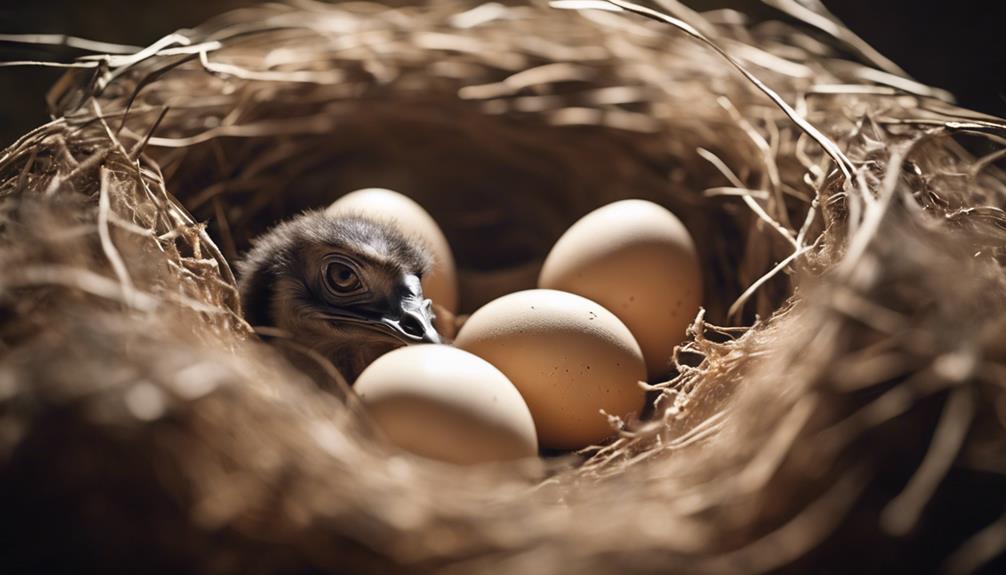
When preparing to care for emu hatchlings, the first step is to create a warm and secure brooder environment. Emu hatchlings require a consistent temperature of around 90-95 degrees Fahrenheit for the first few weeks of their lives. Use a heat lamp or heat pad to achieve this temperature, ensuring that there are cooler areas within the brooder for the hatchlings to regulate their body heat.
In addition to warmth, provide a safe and secure space for the emu hatchlings to thrive. Choose a brooder that's spacious enough for them to move around comfortably but not so large that they get overwhelmed. Line the bottom of the brooder with a soft, non-slippery material like paper towels or straw to prevent leg issues.
Remember to regularly clean the brooder to maintain a hygienic environment for the hatchlings. Emu hatchlings are susceptible to infections, so it's crucial to keep their living space clean and dry. By setting up a warm and secure brooder, you're laying the foundation for successful emu hatchling care.
Setting Up the Brooder
To ensure optimal conditions for the emu hatchlings' growth and well-being, carefully design and set up the brooder environment. The brooder plays a crucial role in the early stages of an emu hatchling's life, providing warmth, safety, and comfort.
Here are three key factors to consider when setting up the brooder:
- Size: Ensure the brooder is spacious enough to allow the hatchlings room to move around freely without feeling crowded. A good rule of thumb is to provide at least 2 square feet of space per hatchling to prevent overcrowding and promote healthy development.
- Bedding: Choose a suitable bedding material such as straw, wood shavings, or paper towels. The bedding should be clean, dry, and comfortable for the hatchlings to rest on. Avoid using materials that are dusty or slippery, as they can pose health risks to the hatchlings.
- Lighting: Install a heat lamp in the brooder to maintain a consistent temperature of around 90-95°F for the first few weeks. Make sure the lamp is securely attached and positioned at a height that allows the hatchlings to regulate their body temperature effectively. Monitor the temperature regularly to ensure it remains within the optimal range for the hatchlings' well-being.
Temperature and Humidity Requirements
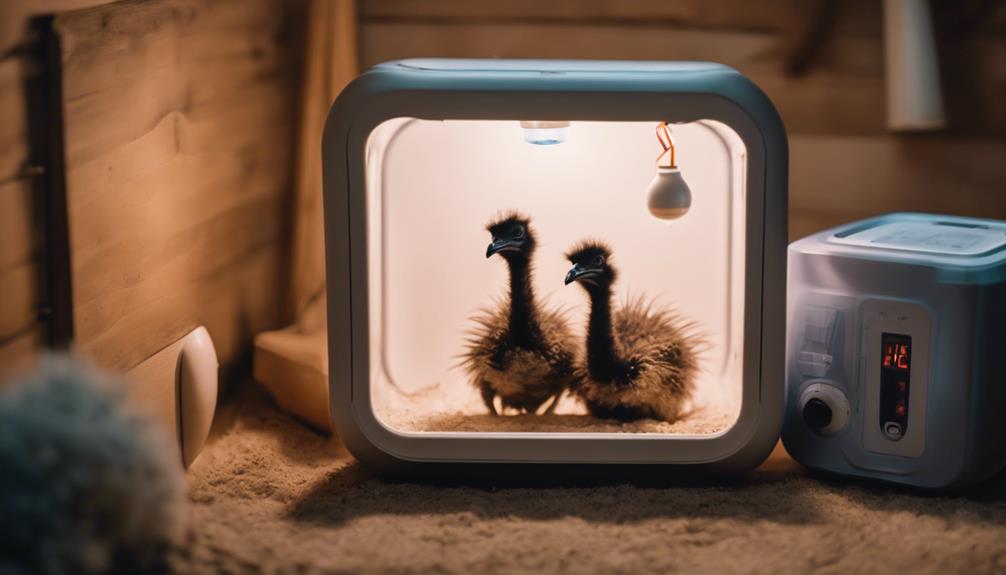
Ensure that the brooder maintains the appropriate temperature and humidity levels to support the health and growth of the emu hatchlings.
Emu hatchlings require a brooder temperature of around 85-90 degrees Fahrenheit during their first week of life. Gradually decrease the temperature by 5 degrees each week until reaching a stable temperature of 70-75 degrees Fahrenheit. Use a thermometer to monitor and adjust the temperature as needed.
Humidity is crucial for emu hatchlings, especially during the hatching process. Maintain humidity levels between 50-60% during incubation and increase it to 65-70% during hatching. After hatching, gradually decrease the humidity to around 50% over the first week. Adequate humidity helps prevent dehydration and aids in the proper development of the hatchlings.
To ensure optimal conditions, use a reliable hygrometer to monitor humidity levels. Mist the brooder with warm water to increase humidity if needed. Proper temperature and humidity regulation are essential factors in fostering the health and well-being of your emu hatchlings.
Feeding Schedule and Diet
Maintain a consistent feeding schedule and provide a well-balanced diet to support the healthy growth and development of your emu hatchlings. Emu hatchlings require specific nutrients at different stages of their growth to ensure they develop properly.
Here are some key guidelines to help you feed your emu hatchlings effectively:
- Feeding Schedule: Establish a feeding routine for your emu hatchlings to provide them with the necessary nutrition consistently. Feed them small amounts multiple times a day to keep their energy levels up and support their growth.
- Protein-Rich Diet: Emu hatchlings need a diet high in protein to aid in their muscle development and overall health. Include sources of protein such as insects, small vertebrates, and commercial emu feed in their daily meals.
- Vitamins and Minerals: Ensure your emu hatchlings receive essential vitamins and minerals like calcium and vitamin E to support their bone development and overall well-being. Incorporate fresh fruits and vegetables into their diet to provide these vital nutrients.
Handling and Socialization
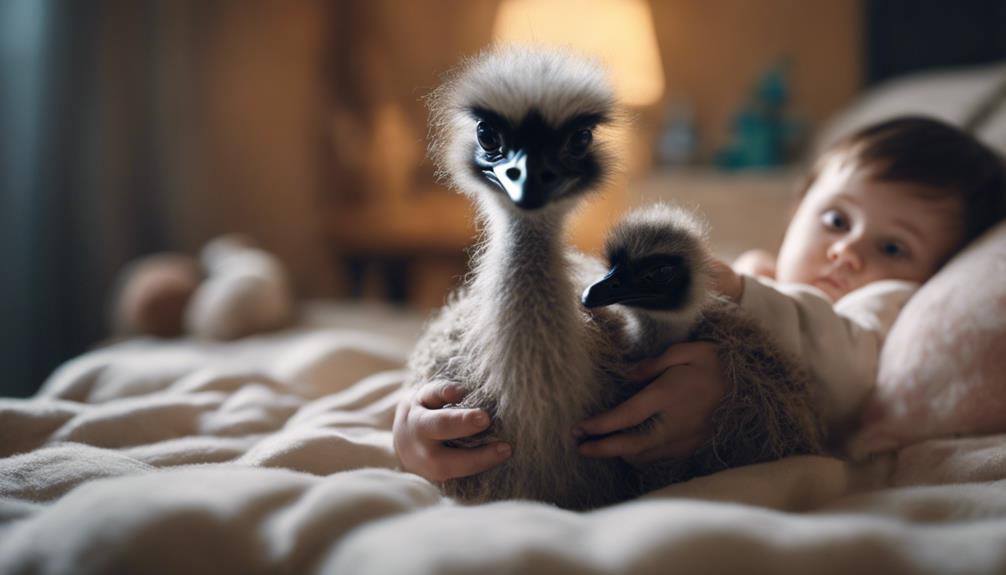
Implement proper handling techniques and socialization practices from the early stages to ensure the well-being and adaptability of your emu hatchlings. Emu hatchlings are sensitive to human interaction, so it's crucial to start handling them gently and regularly to build trust and familiarity. When handling your hatchlings, approach them calmly and confidently, using slow movements to avoid startling them. Emus are naturally curious birds, so engage them in short, positive interactions to help them acclimate to human presence.
Socialization is key to raising well-adjusted emus. Encourage social interactions by introducing your hatchlings to other animals and humans early on. Supervise these interactions closely to prevent any aggressive behavior. Emus raised in a social environment from a young age are more likely to exhibit positive social behaviors as adults. Additionally, providing enrichment activities like toys and puzzles can stimulate their minds and promote healthy social development.
Health Check-ups and Common Issues
To ensure the overall well-being of your emu hatchlings, it's important to monitor their health through regular check-ups and be prepared to address common issues that may arise as they grow. Here are essential guidelines for maintaining the health of your emu hatchlings:
- Regular Veterinary Check-ups: Schedule routine check-ups with an avian veterinarian to ensure your emu hatchlings are healthy and thriving. These check-ups help in early detection of any potential health concerns.
- Proper Nutrition: Provide a well-balanced diet rich in vitamins and minerals suitable for emu hatchlings. Ensure they've access to fresh water at all times to prevent dehydration.
- Watch for Signs of Illness: Monitor your emu hatchlings for any unusual behavior, such as lethargy, loss of appetite, or abnormal droppings. If you notice any concerning symptoms, consult with a veterinarian promptly.
Creating a Safe Environment
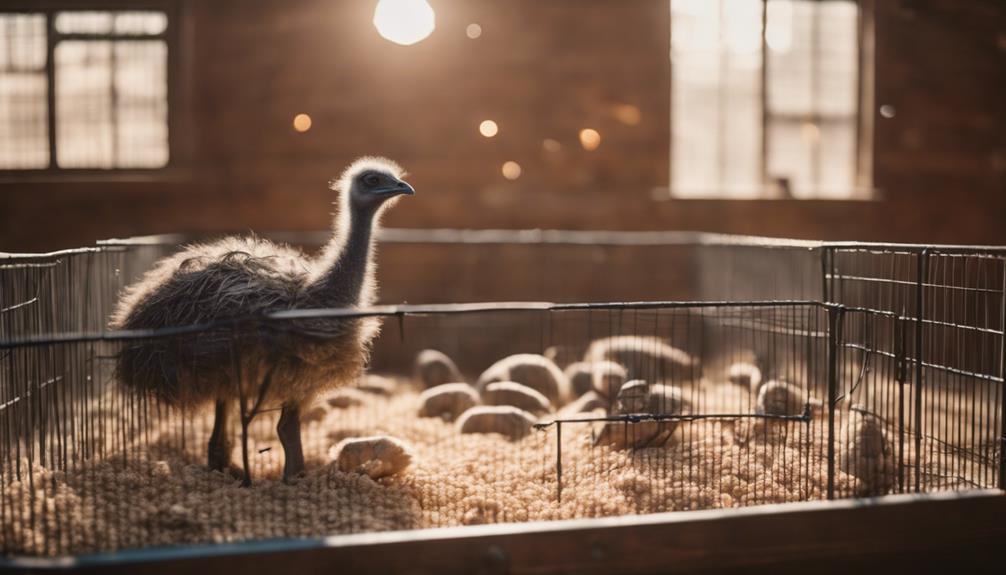
Ensure the environment for your emu hatchlings is secure and conducive to their growth and well-being by following these essential guidelines.
Emu hatchlings require a safe and spacious enclosure to thrive. The enclosure should be predator-proof, with fencing buried at least 6 feet deep to prevent digging predators from gaining access. Ensure that the fencing is tall enough to prevent emus from jumping over, as they're excellent jumpers even at a young age.
Emus are sensitive to temperature changes, so provide a sheltered area with proper ventilation to avoid overheating or chilling. Bedding should be soft, clean, and changed regularly to maintain hygiene and prevent bacterial growth. Emu hatchlings are curious and may peck at objects, so remove any potential choking hazards from their environment.
Additionally, provide clean water at all times and ensure that feed is kept fresh and free from contaminants. By creating a safe and well-maintained environment, you set the foundation for your emu hatchlings to thrive and grow into healthy adults.
Growth and Development Milestones
Track the growth and development milestones of your emu hatchlings to ensure they're progressing healthily and meeting key developmental markers. As your emu chicks grow, here are important milestones to watch for:
- Feather Development: Around 6-12 weeks, your hatchlings should start developing their adult feathers, gradually replacing their downy fluff. Monitor this process to ensure it's progressing smoothly.
- Growth Rate: Emu chicks grow rapidly, doubling in size within the first few months. Regularly weigh your hatchlings to track their growth rate and ensure they're thriving.
- Leg Strength: By 3-4 months, emu hatchlings should have strong, sturdy legs to support their increasing weight. Encourage exercise and monitor their ability to stand and walk comfortably.
Emu Hatchlings' Behavioral Traits
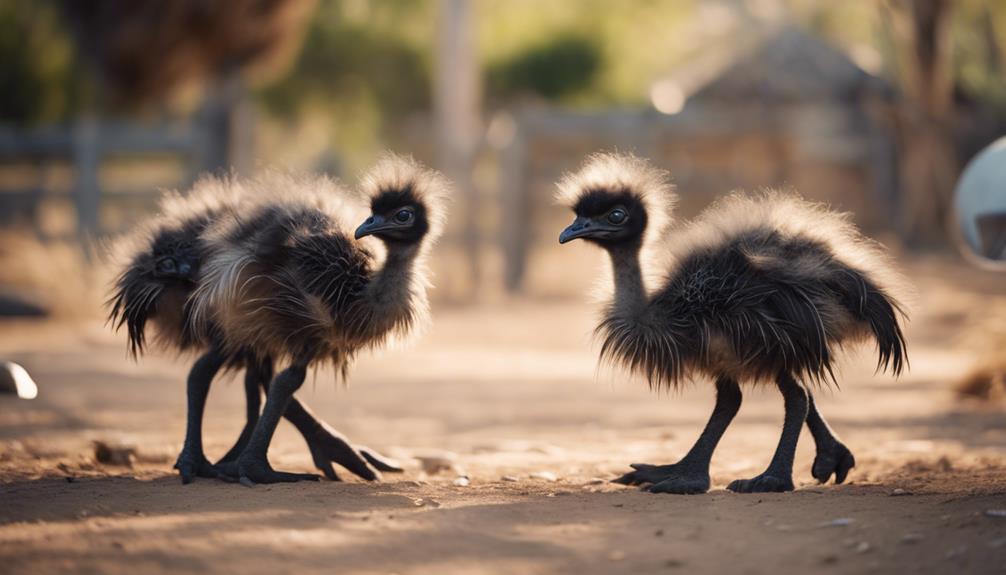
Observing the behavior of your emu hatchlings can provide valuable insight into their development and well-being. Emu hatchlings exhibit intriguing behavioral traits that reflect their unique nature. These young emus are naturally curious and will often explore their surroundings with great enthusiasm. You may notice them pecking at objects, chasing insects, or engaging in playful interactions with their siblings.
Emu hatchlings also display a strong sense of hierarchy within their group. They may jostle for position, establishing dominance through subtle cues like posture and vocalizations. This behavior is essential for them to establish a social order and ensure efficient resource allocation within the group.
Furthermore, emu hatchlings are highly vocal creatures. They communicate through a variety of sounds, from soft chirps to loud calls, to convey their needs and emotions. By paying attention to these vocalizations, you can better understand their moods and respond appropriately to their requirements.
Exercise and Enclosure Space
To promote the optimal development and health of your emu hatchlings, providing adequate exercise opportunities and sufficient enclosure space is crucial. Emu hatchlings are active and curious creatures that require space to move around and explore.
Here are some essential tips to ensure your emu hatchlings thrive:
- Enclosure Size: Emu hatchlings need a spacious enclosure to roam freely. A minimum of 100 square feet per hatchling is recommended to allow for exercise and prevent overcrowding.
- Outdoor Access: Emus are outdoor birds by nature. Providing access to an outdoor area within the enclosure allows hatchlings to bask in natural sunlight, forage for insects, and engage in natural behaviors.
- Obstacle Course: Emu hatchlings enjoy challenges. Introducing simple obstacles like logs or low platforms in their enclosure can encourage physical activity and stimulate their cognitive abilities.
Grooming and Cleaning Tips
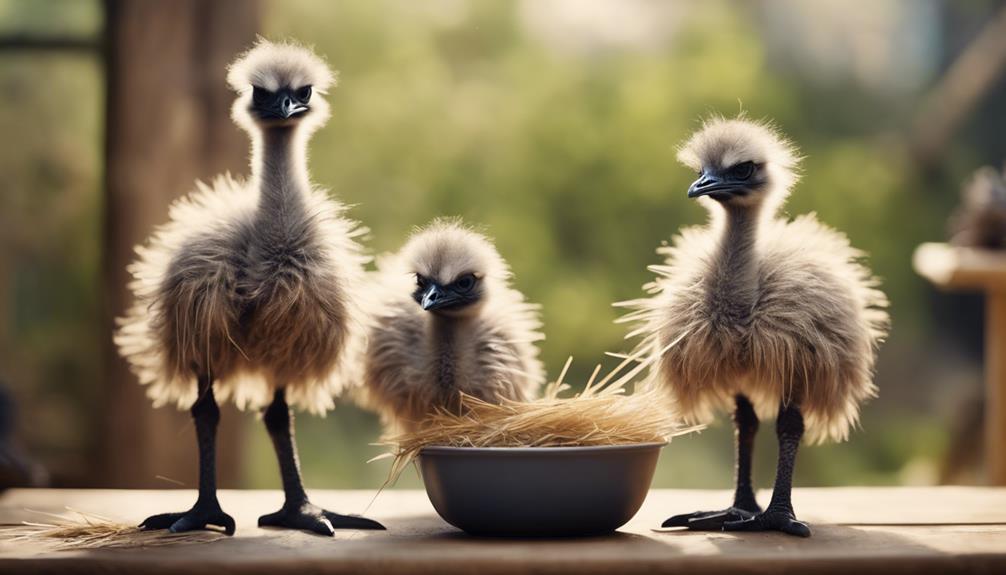
For optimal health and well-being of your emu hatchlings, maintaining proper grooming practices and ensuring a clean environment are essential tasks. Emu hatchlings require clean living conditions to thrive. Regularly clean their enclosure, removing any feces, uneaten food, and soiled bedding. Emus are prone to mites and parasites, so ensure their living space is free of any potential infestations.
Grooming your emu hatchlings is also crucial. Emus have specialized feathers that can become dirty and matted if not properly maintained. Regularly inspect their feathers for any debris or dirt. Use a gentle brush to remove any dirt build-up and prevent matting. Emus enjoy dust baths, which help them keep their feathers clean and healthy. Providing a shallow dish of fine sand or dirt can encourage this natural grooming behavior.
Emu Hatchlings: FAQ Answered
Answer commonly asked questions about caring for emu hatchlings to ensure their well-being and development.
- What should I feed my emu hatchling?
Emu hatchlings require a specialized diet high in protein. Feed them a commercial emu starter feed, finely chopped fruits and vegetables, and hard-boiled eggs for added protein. Ensure access to fresh water at all times.
- How do I provide suitable housing for my emu hatchling?
Create a warm and dry brooding area, like a well-ventilated shed or pen, with heat lamps to maintain a temperature of around 85-90°F. Use soft bedding such as straw or wood shavings to keep them comfortable.
- How can I socialize my emu hatchling?
Emu hatchlings are social animals and benefit from interaction. Spend time talking to them, gently handling them, and providing enrichment activities such as hanging shiny objects for them to peck at. This will help them grow up to be well-adjusted and friendly emus.
Frequently Asked Questions
Can Emu Hatchlings Be Trained to Follow Commands?
Emu hatchlings possess a level of intelligence and can be trained to follow commands. With consistent training, positive reinforcement, and patience, you can establish a bond and teach them various behaviors to respond to your cues effectively.
What Are the Potential Predators of Emu Hatchlings?
In the wild, emu hatchlings face threats from predators such as dingoes, eagles, and feral cats. To protect them, you must create secure enclosures and utilize proper surveillance to deter potential harm.
Do Emu Hatchlings Need Companions for Socializing?
Yes, emu hatchlings benefit greatly from companions for socializing. Interaction with peers enhances their development, communication skills, and overall well-being. Providing companionship creates a more enriching environment for emu hatchlings to thrive and grow.
How Long Do Emu Hatchlings Typically Live?
Emu hatchlings typically live up to 10 years in the wild. With proper care and nutrition, they can reach their full potential. Providing a suitable environment and diet is crucial for ensuring their longevity.
Can Emu Hatchlings Be House-Trained Like Other Pets?
Yes, emu hatchlings can be house-trained to some extent, but it requires consistent effort. Establish a designated area for them to relieve themselves and use positive reinforcement techniques. With patience and consistency, you can successfully house-train emu hatchlings.
Conclusion
As you watch your emu hatchlings grow and thrive in their carefully crafted environment, remember that just like these majestic birds, nurturing requires patience, dedication, and attention to detail.
Much like the emu chicks who rely on us for their well-being, our own growth and success depend on the nurturing care we provide ourselves and those around us.
Embrace the journey of caring for these unique creatures, and you'll discover profound insights into the art of nurturing life.




